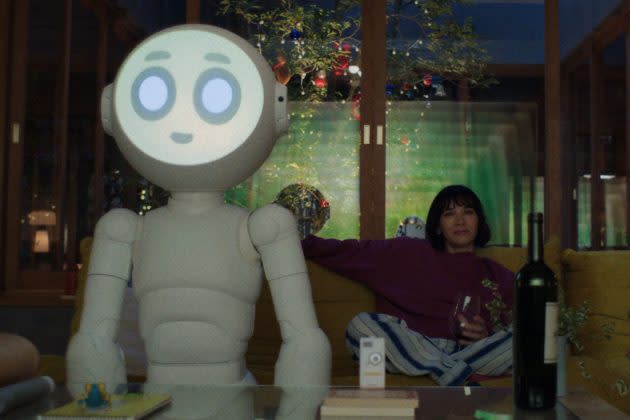Rashida Jones and a Robot Star in Apple’s Stylish, Unsatisfying Mystery ‘Sunny’: TV Review

From “Shōgun” to “Blue Eye Samurai” to “Tokyo Vice,” Japan has been having something of a moment on American TV. Last year, Apple TV+ introduced “Drops of God,” a live-action manga adaptation about a wine empire’s succession crisis, to stateside viewers. With “Sunny,” its new A24-produced half-hour dramedy that stars Rashida Jones as an American housewife abroad, the company now brings this trend in-house. A buddy mystery that pairs Jones’ Suzie Sakamoto with the title character, an intelligent “homebot” left to Suzie by her missing husband, Masa (Hidetoshi Nishijima), “Sunny” conveys an immersive, eye-catching vision of the near future, even when the central storyline can’t quite deliver on its attempts at character-driven suspense.
“Sunny” isn’t animated, like “Blue Eye Samurai,” or a period piece, like “Shōgun” and “Tokyo Vice.” Instead, the show is distinguished by a soft sci-fi aesthetic reminiscent of Spike Jonze’s “Her.” Suzie, Masa and their young son live in Kyoto, a city with historic architecture and serene religious sites that contrasts with dense, tall, neon-lit Tokyo. The locale provides an ideal backdrop for the genial domesticity of the series’ technology, from trash-collecting droids to Game Boy-like “devices” that take the place of smartphones. “Sunny” was adapted by Katie Robbins from Colin O’Sullivan’s novel “The Dark Manual,” but its most tangible contributions come from the craft team, including production designer Shinsuke Kojima and art director Masaharu Maeda.
More from Variety
MSNBC Isn't Using Blue-State Chatter to Build a Daytime Nation
Hulu Orders Comedy Series 'The Other Black Girl' With Rashida Jones Producing
Rashida Jones and Will McCormack Sign First Look Deal at Lionsgate TV, Develop 'Lovesick' Adaptation
Suzie struggles to navigate this new reality, about a decade distant from our own, even before Masa and her son disappear after a suspicious plane crash. Having lost her mother in a self-driving car accident, Suzie is a technophobe who loathes robots. (Upon Sunny’s delivery by Masa’s colleague, she’s shocked to learn that her spouse had spent his life building them. He’d told her he worked on refrigerators.) Suzie also hasn’t bothered to learn Japanese, instead relying on auto-translating earbuds. She claims her dyslexia makes new languages a challenge, but over 10 episodes, we start to see Suzie’s insistence on English as one of many misanthropic tendencies. Her way of saying goodbye to Masa at the airport is by flipping him the double bird.
The sudden absence of her nuclear family none-heless forces Suzie to seek help, whether from her mother-in-law, Noriko (Judy Ongg), or her new friend Mixxy (musical comedian annie the clumsy), a bartender who offers to assist Suzie’s investigation into her family’s fate. Out of desperation, Suzie even comes to rely on Sunny. Voiced by Joanna Sotomora, Suzie’s companion may resemble a more globular Michelin Man with an animatronic display, but she’s been custom-coded by Masa with a personality as prickly as his wife’s. Gradually, the two become collaborators, and even something like friends.
This dynamic is endearing, and Jones capably acts opposite her anthropomorphic scene partner. (She also sports a slew of remarkable outfits, courtesy of costume designer Analucia McGorty. If Suzie has assimilated to any degree, it’s in her fashion sense.) But “Sunny” can get distracted from its core mission of explicating Suzie’s loneliness and, retroactively, marriage. The yakuza emerge as cookie-cutter villains, and while aspiring boss Hime (mononymous actress You) pulls off an eye-catching haircut, her crusade against sexism in organized crime doesn’t hold our attention. Noriko gets cut off from the rest of the cast, and any potential insight into her son along with her.
By the finale, the audience doesn’t have enough clarity on Suzie for her journey to feel fully satisfied; we never learn, for example, what — or who — she left behind in the States. But this surreal, alternate Japan still delivers such bravura se- quences as a flock of corporate drones donning VR sets for a coordinated stretching routine straight out of “Severance.” The penultimate episode, a mock game show set inside Sunny’s mechanical mind, manages to marry the show’s world-build- ing with its emotional substance. Even if “Sunny” doesn’t hit this sweet spot consistently, it’s nice to know it’s there.
Sign up for Variety’s Newsletter. For the latest news, follow us on Facebook, Twitter, and Instagram.

